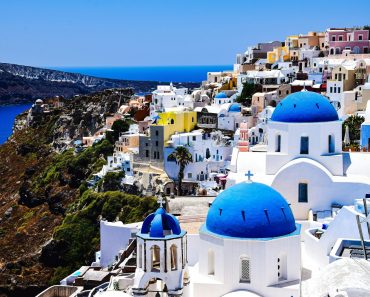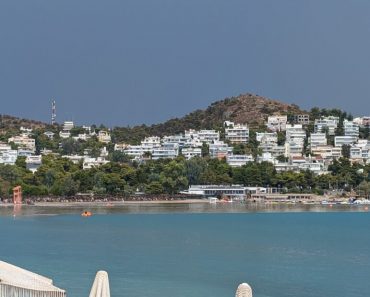Monday, October 7, 2024

The Greek tourism industry, one of the country’s largest economic sectors, is facing significant challenges that could jeopardize its future. Despite attracting a record-breaking 33 million tourists in 2023—an increase of 5 million from the previous year—a new government watchdog report has warned that Greece could lose its status as a top global tourist destination unless urgent action is taken to address key environmental and developmental issues.
Greece’s world-renowned archaeological sites, pristine beaches, and idyllic landscapes have long made it a favored destination for travelers seeking history, culture, and natural beauty. However, unchecked construction, the overuse of water resources, and the degradation of coastal areas are threatening to damage the very attractions that draw millions of visitors each year.
The Impact of Overdevelopment on Greece’s Tourism Industry
One of the key concerns outlined in the report is the rapid pace of construction, particularly in popular tourist areas such as the Greek islands. With more hotels, resorts, and infrastructure projects springing up to accommodate the influx of visitors, the watchdog warns that the current model of growth is unsustainable.
According to the report, the unregulated construction boom has led to increased strain on local environments, including the destruction of natural habitats, deforestation, and the loss of biodiversity. The Greek government has been urged to put in place stronger regulations to control new developments, especially in sensitive areas along the coastlines and near archaeological sites.
Athens, Mykonos, and Santorini—which are among the most visited destinations in the country—have experienced particularly intense development pressure. While these regions benefit economically from tourism, they also face environmental risks, including overcrowding, waste management issues, and the depletion of local resources.
In addition to construction, the report highlights the potential long-term damage that unchecked development can have on Greece’s cultural heritage. As tourist demand increases, there are growing concerns about the preservation of Greece’s ancient sites, such as the Acropolis and Delphi, which are already experiencing wear and tear from millions of visitors annually.
Water Resources Under Threat
Another significant challenge facing the Greek tourism industry is the overuse of water resources, particularly on the islands. The report warns that continued strain on water supplies—exacerbated by tourism and the construction of new facilities—could result in serious shortages for both locals and visitors alike.
Many popular tourist destinations in Greece, especially Santorini, Rhodes, and Crete, rely heavily on water supplies that are already under stress due to growing demand. The watchdog’s report notes that the combination of climate change and increasing tourism has placed additional pressure on these areas, leading to concerns about water availability during peak tourist seasons.
The watchdog has called on the government to implement water conservation measures and improve water management infrastructure to ensure that the needs of both residents and tourists can be met without compromising the environment. Furthermore, sustainable tourism practices—including water recycling and more efficient use of resources—are recommended as solutions to mitigate the impact of tourism on Greece’s water supplies.
Coastal Areas and Marine Life at Risk
Greece’s coastal areas and marine ecosystems are among the most attractive features for visitors. However, these natural assets are also at risk due to the impact of tourism-related activities. The report emphasizes the need for urgent action to protect beaches, coral reefs, and marine life from the negative effects of overdevelopment, pollution, and mass tourism.
The construction of beachfront properties and resorts has led to the erosion of natural coastlines, while marine pollution—caused by increased boat traffic, waste disposal, and inadequate sewage systems—has damaged marine biodiversity. The watchdog has called for tighter regulations to protect Greece’s fragile coastal ecosystems, including stricter limits on new developments near beaches and more robust environmental protections for marine areas.
If these issues are not addressed, the report warns that Greece could see a decline in the very features that make the country so attractive to visitors—its clean beaches, clear waters, and thriving marine life. As tourists increasingly seek destinations that prioritize sustainability and environmental stewardship, Greece risks falling behind other destinations that are making proactive efforts to protect their natural resources.
A Call for Sustainable Tourism Practices
The government watchdog’s report makes a clear case for a shift towards sustainable tourism in Greece, urging the nation to adopt a more responsible approach to development that balances the economic benefits of tourism with environmental protection and resource conservation.
Key recommendations from the report include:
- Stricter construction regulations: The Greek government should implement stricter controls on construction projects, particularly in sensitive areas near coastlines and historical sites. This includes setting development limits in overcrowded tourist destinations to reduce pressure on local infrastructure and ecosystems.
- Water management improvements: Investment in modern water infrastructure is essential to address the growing demand for water in popular tourist regions. Measures such as rainwater harvesting, water recycling, and desalination plants can help mitigate the impact of tourism on local water resources.
- Protecting coastal and marine environments: Greece should introduce stricter environmental regulations to protect its beaches, coastlines, and marine ecosystems. This includes limiting construction near the coastline, reducing marine pollution, and establishing protected zones for marine biodiversity.
- Promoting eco-friendly tourism initiatives: The government and the tourism sector should work together to promote eco-friendly tourism options, such as sustainable accommodation, renewable energy use, and green certifications for hotels and tour operators. This will help attract environmentally conscious travelers and ensure that Greece remains competitive in a market increasingly focused on sustainability.
- Cultural heritage preservation: Investment in the preservation of archaeological sites and cultural landmarks is essential to ensure that Greece’s rich history remains intact for future generations. This includes implementing visitor limits at popular sites to reduce wear and tear and investing in restoration projects.
The Future of Greece’s Tourism Industry
With tourism accounting for a significant portion of Greece’s GDP, the government must take the recommendations from the watchdog report seriously. Failure to address the environmental and infrastructural challenges facing the sector could lead to a decline in visitor numbers, as tourists increasingly seek destinations that prioritize sustainability and environmental protection.
Greece has an opportunity to reposition itself as a leader in sustainable tourism, drawing on its natural beauty and rich cultural heritage to attract visitors who are mindful of their environmental impact. By adopting eco-friendly practices, improving infrastructure, and protecting its natural resources, Greece can ensure that its tourism industry continues to thrive for years to come.
However, the time to act is now. With the world’s eyes on Greece as a premier tourist destination, the government must take immediate steps to protect its coasts, water resources, and archaeological sites from the negative effects of overdevelopment and climate change.
Conclusion: A Path Forward for Greece
Greece’s tourism industry is at a crossroads. The challenges outlined in the watchdog report are serious, but they are not insurmountable. With decisive action, Greece can safeguard its position as one of the world’s most beloved tourist destinations while ensuring that future generations can enjoy the country’s natural beauty, cultural heritage, and world-class attractions.








